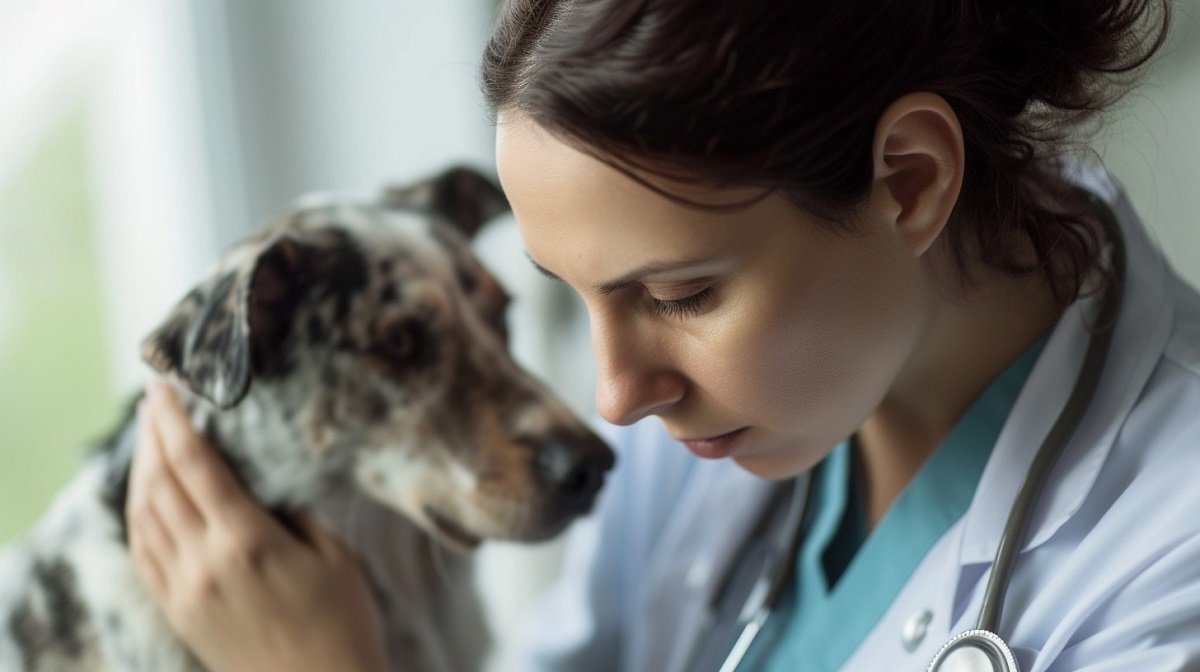Dogs of all ages and breeds can develop pneumonia, a dangerous respiratory disease. Symptoms of pneumonia in dogs is to discuss today. It happens when an infection causes inflammation in the lungs, resulting in a range of symptoms that can differ in intensity. Understanding the symptoms of canine pneumonia is essential for early diagnosis and timely veterinary care. This post will discuss the signs and symptoms of canine pneumonia, possible causes, and the significance of receiving prompt medical attention.
Top 10 Symptoms Of Pneumonia In Dogs
One potentially dangerous respiratory ailment that can strike our cherished dog friends is pneumonia. Early detection of pneumonia in dogs is essential for better prognosis and timely veterinary care. This article will examine the top 10 signs of pneumonia in dogs, providing insight into the preventative measures pet owners can take to ensure the respiratory health of their furry companions.
1. Persistent Coughing:
One of the most common signs of pneumonia in dogs is a chronic, hacking cough. The presence of mucus or a dry cough suggests irritation and inflammation in the respiratory tract. A chronic cough is one of the most typical signs of pneumonia in dogs. The cause of the cough, which can be dry or produce mucus, is frequently lung inflammation. Coughing is one symptom of Symptoms of pneumonia in dogs.
2. Labored Breathing:
Pneumonia in dogs can cause breathing difficulties or shallow, fast breathing. Breathing difficulties may indicate that an infection is preventing the lungs from working at their best. Pneumonia in dogs frequently causes shallow, fast breathing or difficulty breathing. It may be a sign of a respiratory problem if you see your dog panting excessively or having trouble breathing for no apparent reason.
3. Lethargy and Weakness:
A dog suffering from pneumonia may become lethargic and weak. Your once-vibrant pet may be exhibiting signs of an underlying respiratory issue if they appear abnormally tired, disinterested in activities, or reluctant to move. Dogs with the infection frequently feel lethargic and lacking in energy. A decline in physical activity, a reluctance to play, or a generally meek attitude can all be signs of lethargy.
4. Fever:
Fever is a typical reaction to infection, and elevated body temperature is seen in dogs that have pneumonia. It’s important to keep an eye on your dog’s temperature because a persistent fever may be a sign of a more serious infection. An infection frequently causes the body to become hotter. Pneumonia in dogs can cause a fever, and keeping an eye on their temperature can help determine how serious the illness is. Fever is a symptoms of pneumonia in dogs
5. Nasal Discharge:
Nasal discharge production may increase as a result of pneumonia. Depending on the underlying cause of the infection, the discharge can be clear or tinted green or yellow. Pay attention to your dog’s nose. Pneumonia and respiratory distress may be indicated by an increase in nasal discharge, which may be clear or tinted.
6. Appetite Loss:
Canines with pneumonia may become apathetic toward food. An underlying respiratory problem may be the cause of your dog’s refusal to eat or decreased appetite. Appetite loss is symptoms of pneumonia in dogs. Dogs suffering from pneumonia may find that they are less interested in eating or that they are not eating at all. Any dietary changes should be discussed with a veterinarian right away.
7. Blue Discoloration of Gums and Tongue (Cyanosis):
Pneumonia that is severe enough to cause hypoxia in the bloodstream can result in cyanosis, or bluish discolouration of the tongue and gums. This is a serious indication that needs to be addressed by a veterinarian right away. A severe oxygen shortage in the bloodstream can result in cyanosis, which causes the tongue and gums to turn blue. This is a serious symptom that has to be treated by an emergency veterinarian.
8. Gagging or Vomiting:
Gagging and vomiting are common symptoms of pneumonia in dogs, especially if the respiratory irritation affects the gastrointestinal tract. This symptom can be quite upsetting and needs to be addressed right away. Vomiting is one symptoms of pneumonia in dogs.
9. Weight Loss:
Loss of overall health due to pneumonia can cause weight loss. It is imperative to look into the cause of any noticeable and inexplicable decrease in your dog’s weight, including any possible respiratory problems. Weight loss is a symptoms of pneumonia in dogs.
10. Increased Respiratory Rate at Rest:
Keep an eye on your dog’s typical breathing rate. Even while your dog is at rest, increased breathing may be a sign of an underlying respiratory issue, such as pneumonia.
Causes of Dog Pneumonia
1. Bacterial Infections:
One common cause, which frequently arises from inhaling infectious agents, is bacterial pneumonia. Streptococcus and Bordetella bronchiseptica are common bacteria.
2. Viral Infections:
Dog pneumonia can also result from viruses like canine distemper and influenza.
3. Fungal Infections:
Pneumonia can be brought on by fungi like Aspergillus, particularly in dogs whose immune systems are weakened.
4. Aspiration:
Aspiration pneumonia can result from breathing in foreign objects, such as food particles or vomit.
5. Parasitic Infections:
In dogs, respiratory distress and inflammation can be brought on by parasites such as lungworms.
Dog Grooming Clippers with 2.3L Vacuum Suction 99% Pet Hair
Conclusion
Early detection and intervention of pneumonia in dogs depend on being aware of these top 10 symptoms. You must see a veterinarian right away if you observe any of these symptoms in your pet. A prompt diagnosis and course of treatment can greatly increase your dog’s chances of making a full recovery and enable them to lead a happy and healthy life again. These all are Symptoms of pneumonia in dogs A proactive approach to respiratory health and routine veterinary check-ups can help keep your dog friend free from pneumonia and other respiratory ailments.
Early detection and treatment of canine pneumonia depend on the ability to recognize its symptoms. In the event that your dog exhibits any of these symptoms, you must seek immediate veterinary attention. Prompt action can stop the disease’s progression and increase the likelihood of a full recovery. In addition to lowering the risk of pneumonia, regular veterinary check-ups, vaccinations, and a clean living environment can help maintain your dog’s general respiratory health.



